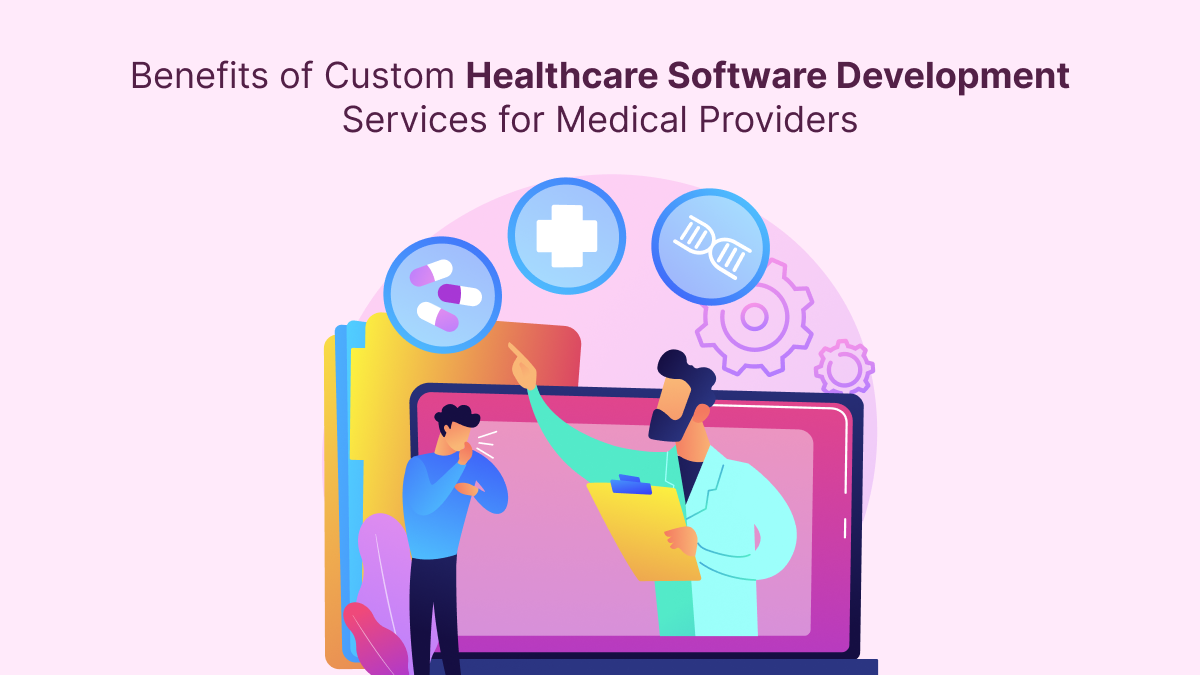Benefits of Custom Healthcare Software Development Services for Medical Providers

The healthcare industry is constantly evolving, and with that evolution comes a growing need for better tools and technology. Medical providers are under more pressure than ever to deliver faster, more accurate care while managing rising patient numbers and maintaining regulatory compliance. In this landscape, custom healthcare software development services have emerged as a vital solution.
Unlike generic software, custom healthcare software is specifically built around the needs of individual clinics, hospitals, and medical professionals. Whether it’s streamlining appointment scheduling, simplifying electronic health records (EHR), or automating billing processes, custom solutions are designed to work the way healthcare providers work—not the other way around.
This blog will explore the key benefits of using custom healthcare software development services, especially for medical providers looking to improve their operations, enhance patient care, and stay competitive in a tech-driven world.
Why Custom Software Over Off-the-Shelf Solutions?
Tailored to Specific Workflows
One of the biggest advantages of custom healthcare software is that it is designed to fit the unique needs of a specific medical practice or organization. Off-the-shelf solutions often force clinics to adjust their workflows to match the software. With custom software, the solution is built to support how your team already operates, which means less disruption and faster adoption.
Greater Flexibility
Custom software can be modified as the needs of the healthcare provider evolve. Whether you’re adding new services, expanding your facility, or integrating new technologies, a custom system can adapt with you—without needing to switch platforms or compromise on functionality.
Enhanced Integration Capabilities
Many medical providers already use a range of systems—from EHR platforms to billing software to diagnostic tools. Custom software can be built to integrate smoothly with existing systems, improving data flow and reducing the need for manual entry.
Improved User Experience
Generic platforms often come with features that are unnecessary or missing critical functions that a clinic needs. Custom solutions are built with input from real users, which results in interfaces that are easier to use and aligned with daily routines. This boosts productivity and reduces training time for staff.

Benefits for Medical Providers
Streamlined Operations
Custom healthcare software can automate time-consuming administrative tasks such as patient intake, scheduling, billing, and report generation. By reducing manual work, staff can focus more on direct patient care and less on paperwork.
For example, an appointment management module can allow patients to book, reschedule, or cancel appointments online while notifying the clinic in real time. This eliminates the need for back-and-forth phone calls and avoids scheduling conflicts.
Enhanced Patient Care
Better data access leads to better care. With custom EHR solutions, medical providers can quickly view patient histories, allergies, test results, and past treatments in one centralized system. This allows for more informed decisions, faster diagnoses, and fewer errors.
Custom software can also include tools for treatment planning, medication tracking, and patient reminders, all of which contribute to improved outcomes and patient satisfaction.
Data Security and Compliance
Healthcare data is highly sensitive and regulated. Custom solutions are developed with security in mind from the beginning. Developers can implement industry best practices and ensure that the software complies with all relevant laws and regulations, such as HIPAA in the U.S.
Unlike mass-market products, which may have general security features, custom solutions can include specific protections tailored to your organization’s risk profile.
Better Communication and Coordination
In larger healthcare environments, different departments need to collaborate seamlessly. Custom software enables better coordination between departments like radiology, pharmacy, and labs by providing shared access to up-to-date data.
This real-time access helps prevent duplicate tests, medication errors, and miscommunication, all of which improve overall patient care and reduce delays.
Scalability and Long-Term Value
Custom healthcare software is built with your growth in mind. Whether your clinic is expanding, adding new services, or adapting to regulatory changes, the software can scale accordingly.
Although the initial investment may be higher compared to off-the-shelf software, the long-term benefits such as reduced downtime, fewer errors, better compliance, and improved patient retention make custom solutions a smart financial decision.
Common Types of Custom Healthcare Software
Electronic Health Record (EHR) Systems
Custom EHR platforms are designed around your medical team’s specific documentation practices. These systems can improve accuracy, enhance patient history tracking, and integrate with lab and pharmacy systems to streamline the patient journey.
Practice Management Systems
These systems help with managing appointments, staff schedules, patient billing, and administrative workflows. When customized, they align perfectly with your clinic’s daily routines, which helps reduce bottlenecks and increase efficiency.
Telemedicine Platforms
Custom telemedicine solutions allow medical providers to offer remote consultations through secure video calls, manage digital prescriptions, and share reports—all while being tailored to the provider’s exact services and branding.
Mobile Health Applications
Mobile apps can be designed for both patients and healthcare professionals. Patients can use apps to track medications, set appointment reminders, and access medical records, while doctors can use them for real-time updates and communication.
Read more: How Healthcare Software Development Improves Efficiency and Accuracy?
Custom Billing and Insurance Software
Medical billing is complicated, with codes, claims, and regulations varying widely. A custom billing platform can automate insurance claims, detect errors before submission, and ensure faster reimbursements, which keeps cash flow healthy.
Real-World Example
Consider a small specialty clinic that offers both in-person and virtual consultations. An off-the-shelf system might not support both workflows properly or may require the clinic to subscribe to multiple tools.
By working with a software development team, the clinic can build a platform that allows patients to book appointments online, attend video calls, pay bills, and receive prescriptions—all in one place. Staff can manage patient records, set reminders, and access lab results with ease. Over time, this kind of system can cut down administrative costs and improve patient satisfaction dramatically.
Challenges to Consider
Initial Development Time
Creating custom software takes time. It involves requirements gathering, design, testing, and revisions. However, this upfront time investment results in a product that works exactly how it should.
Higher Upfront Investment
While custom software may cost more at the beginning, the long-term savings, increased productivity, and better patient outcomes often justify the expense.
Ongoing Maintenance
Like any software, custom solutions need updates and maintenance. It’s essential to partner with a reliable development team that offers long-term support and updates as needed.
How to Choose the Right Development Partner
When investing in custom healthcare software, it’s important to work with a team that understands both technology and healthcare. Look for a company with experience in the medical field, a proven track record, and the ability to deliver secure, scalable, and user-friendly solutions.
Transparency, communication, and a collaborative approach are also key factors. The more involved your team is in the development process, the more likely the software will meet your real-world needs.
Conclusion
Custom healthcare software development services offer a wide range of benefits for medical providers, from improving efficiency and accuracy to enhancing patient satisfaction and ensuring regulatory compliance. By building solutions that fit your unique needs, custom software removes many of the limitations found in off-the-shelf tools. Whether you’re a solo practitioner, a growing clinic, or a large hospital network, custom software can help you deliver better care while operating more efficiently. Working with a trusted app development company ensures that your custom solution will be secure, scalable, and built for long-term success.
FAQs
What is custom healthcare software? Custom healthcare software is designed specifically for a medical provider or organization, based on its unique workflows, patient needs, and operational requirements.
How does custom software improve patient care? It provides doctors and staff with accurate, real-time data and tools tailored to their processes, allowing for faster decisions, fewer errors, and better communication with patients.
Is custom software better than off-the-shelf solutions? For many providers, yes. Custom software fits specific needs, integrates with existing systems, and grows with your organization, whereas off-the-shelf options may require compromise.
Can custom software help with compliance? Absolutely. Developers can build features that support compliance with healthcare regulations and include detailed audit trails and security protections.
What types of custom software do healthcare providers use? Common types include EHR systems, practice management tools, telemedicine platforms, mobile health apps, and billing/insurance processing software.




